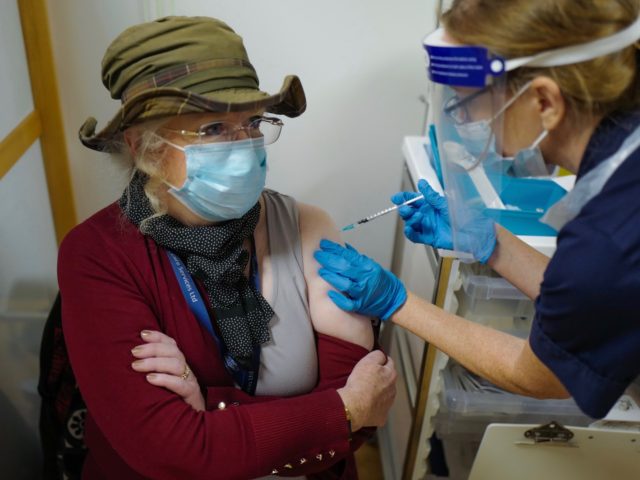Britain’s National Health Service (NHS) confirmed on Wednesday that it is deploying “resuscitation facilities” in coronavirus vaccination centres following the revelation that two healthcare workers suffered anaphylactoid reactions after receiving the Pfizer/BioNTech vaccine on the first day of rollout.
Following the adverse reactions experienced by the two healthcare workers, the Medicines and Healthcare products Regulatory Agency (MHRA) issued “precautionary advice” which said that people who have a “history of a significant reaction” to medicines, foods, or vaccines should avoid taking the coronavirus vaccine.
The new advice went on to state: “Resuscitation facilities should be available at all times for all vaccinations. Vaccination should only be carried out in facilities where resuscitation measures are available.”
In comments made to Breitbart London on Wednesday, an NHS spokesman said that “vaccination hubs all follow the guidelines set by the MHRA”.
The NHS also said that it is seeking “further information and will issue further advice following investigation”.
Breitbart London approached the MHRA for comment but the medical body did not respond by the time of publication.
The NHS describes anaphylaxis as a “severe and potentially life-threatening reaction to a trigger such as an allergy,” which is the result of the body’s immune system “overreacting to a trigger” such as certain types of medication.
A professor of pharmacoepidemiology at the London School of Hygiene and Tropical Medicine, Stephen Evans said: “Allergic reaction occurs with quite a number of vaccines, and perhaps even more frequently with drugs. So it is not unexpected.”
“The Pfizer data showed that about 0.6% of people had some form of allergic reaction in the trial on the vaccine, but about 0.5% on placebo. So there was a genuine excess of allergic reaction but this was small and the true rate is not known, and there is a lot of uncertainty around that estimate.
“The only thing that is contraindicated with this vaccine (meaning you mustn’t have it) is hypersensitivity to the vaccine or any of the excipients (other things in the vaccine), but some people won’t know if they have hypersensitivity to some constituents of the vaccine.”
Professor Evans said that it would “be wise” for those who have a history of allergic relations, such as those who need to carry an autoinjector like EpiPens, to put off taking the vaccine “until the reason for the allergic reaction has been clarified.”
The British healthcare system has previously warned that women who are pregnant or are breastfeeding should avoid taking the vaccine until more information becomes available.
On Tuesday, the United Kingdom began to roll out the vaccine developed by the American company Pfizer and Germany’s BioNTech, which is the first coronavirus vaccine in humans to be adopted by any Western nation.
Follow Kurt Zindulka on Twitter at @KurtZindulka

COMMENTS
Please let us know if you're having issues with commenting.